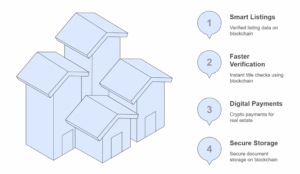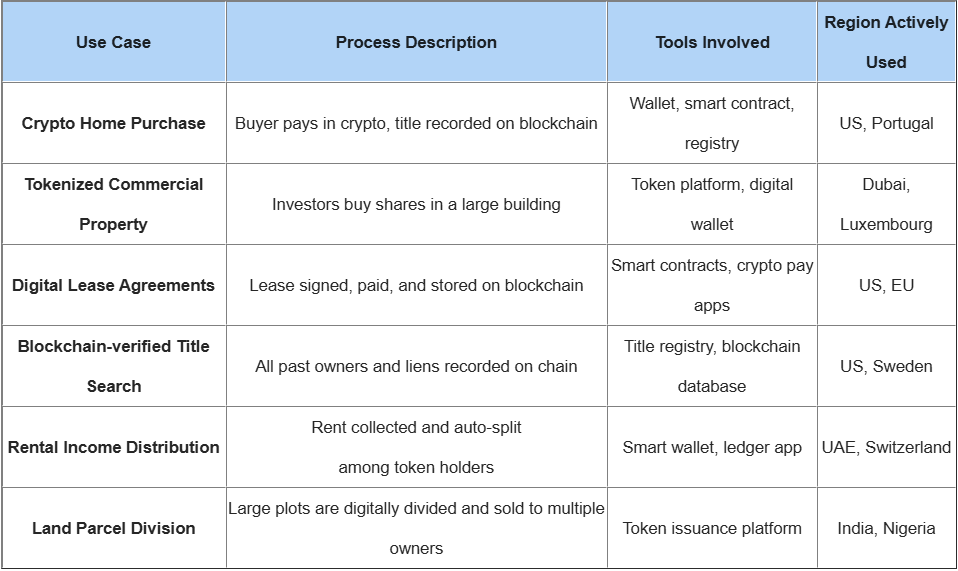Why do property deals still take weeks of back-and-forth paperwork, endless emails, and hidden fees? In a world where we can transfer money instantly, why does buying or selling a property feel stuck in the past? That’s the problem this technology is starting to fix. The global market for real estate tokenization was $2.7 billion in 2022. Experts believe it could reach $16 trillion by 2030. That’s not a small trend. That’s a major shift. And the driver behind this shift is blockchain in real estate. This guide explains how blockchain technology in real estate changes how ownership is recorded, how deals are done, and how money flows.
What Is Blockchain in Real Estate?
Let’s keep it simple. It’s using blockchain to make property transactions faster, cheaper, and more secure.
Blockchain is a digital ledger. It records every transaction, and no one can change what’s written without agreement. That means if someone buys a property, everyone sees the record, and no one can fake it. In real estate, this applies to titles, escrows, contracts, and payments.
More than $4 billion in property transactions already use blockchain systems. That shows trust is building. It also shows that this isn’t just theory. It’s happening right now.
With blockchain, documents become digital, ownership gets verified in minutes, and errors drop. That means fewer middlemen, fewer delays, and lower costs, key benefits especially relevant in blockchain commercial property.
Blockchain is reshaping how real estate transactions are handled, offering more transparency and trust. For those new to the space, this breakdown of what blockchain is provides a solid foundation.
How Blockchain Works in Real Estate Transactions
Think of a real estate transaction like a chain of events: listing, offer, contract, payment, and transfer. Normally, every step includes paperwork, multiple systems, and different parties, brokers, escrow, banks, and title firms.
Here’s how it works:
- A property listing is uploaded with verified documents.
- A buyer makes an offer. It’s time-stamped on the blockchain.
- Smart contracts automate the next steps: escrow deposit, title checks, and agreement terms.
- Payments can be verified and completed using cryptocurrency or stablecoins.
- Once done, ownership is transferred digitally and permanently recorded.

Blockchain Applications in Real Estate: From Listings to Closing
It doesn’t just work at the transaction level, the application of blockchain in real estate supports the full journey, from finding a listing to signing the deal.
Smart Listings with Verified Data
Most listings today are missing key documents or include errors. Using blockchain, platforms can show verified title, owner ID, zoning records, and permit status right in the listing. This saves time for both buyers and agents.
Faster Title Verification
Title checks take time and money. But blockchain technology in real estate allows instant checks through public, unchangeable records. This reduces fraud risk and legal disputes.
Digital Payments and Settlements
Instead of wire transfers and bank delays, buyers can send crypto payments. These transactions are logged and confirmed on the blockchain. That cuts hours or even days from the payment cycle.
Secure Document Storage
Buyers and sellers need to store inspection reports, contracts, and disclosures. When stored using blockchain real estate software development models, these documents are secure and easily accessible.

As real estate platforms look to modernize, many are turning to decentralized solutions for security and efficiency. LITSLINK’s blockchain development services support projects looking to implement smart contracts and tokenization.
Can You Buy Property with Crypto? Blockchain Real Estate Use Cases
Yes, you can. But it depends where you live, and which sellers accept crypto. Some deals use stablecoins, which are tied to fiat currency. Others use major coins like Bitcoin.
The important part isn’t the coin, it’s the system. Blockchain real estate investing lets you pay, sign, and receive title without printed paperwork.
Here are some real use cases and how each step works.

Real estate tokenization blockchain
Real estate tokenization means turning a real property or a piece of it into a digital token that lives on the blockchain. Each token represents a fraction of the ownership. This is not just about small buyers.
Institutions also use tokens to manage large portfolios. Analysts predict between $4 trillion and $5 trillion of tokenized digital securities could be issued by 2030. That’s a massive change in how asset ownership is handled.
Tokenization reduces barriers. It allows 24/7 trading, easier valuation, and quick transfers. For developers, it can open up capital from a global base. For investors, it means entering the blockchain real estate market with smaller amounts.
Tokenization is one of the most important blockchain solutions for real estate because it solves access, speed, and trust all at once.
Benefits of Blockchain in Real Estate
Using blockchain in real estate is not about adding more tech. It’s about removing waste. The right systems reduce paperwork, close deals faster, and help everyone involved, from the broker to the buyer, trust what’s recorded.
Here’s how the benefits of blockchain in real estate show up in everyday property deals.
1. Transparency and Trust
Blockchain creates a single source of truth. When every party sees the same record, buyers, sellers, lenders, and the government, no one can hide changes. This reduces fraud and miscommunication.
For example, blockchain real estate transactions store every action with timestamps. This helps during audits or when legal questions arise. Trust improves because every piece of property data is visible and secure.
2. Better Access to Investments
Tokenization lets people invest without buying a full property. That’s a breakthrough. Platforms using blockchain real estate software development open markets to anyone with a wallet and compliance clearance.
This access is helping global investors tap into regional markets. A buyer in Europe can now invest in a US rental project through verified blockchain applications in property.
3. Stronger Property Rights and Recordkeeping
One of the most lasting changes from blockchain impact on real estate is better title recording. In many countries, property rights are unclear. Blockchain fixes that. It offers secure, transparent, and public ownership records.
Bringing blockchain to real estate often starts with building a custom platform. If you’re planning your own solution, our app cost calculator can help you estimate development expenses.
Top Real Estate Blockchain Projects and Platforms to Watch
More companies are building systems that solve real-world real estate problems. Here are two big examples changing how we handle digital ownership and investment through blockchain in real estate industry, answering the question: how does blockchain help in real estate?
DAMAC and MANTRA Partnership Dubai-based developer DAMAC Group signed a $1 billion deal with blockchain platform MANTRA. Their goal? Tokenize real-world assets, including real estate properties. This project aims to improve global access to Dubai real estate using compliant blockchain frameworks.
The focus is to remove cross-border buying barriers and make the deal process smoother for non-residents. It’s one of the biggest steps in real estate blockchain projects so far.
BlocHome Using Tokeny in Luxembourg BlocHome is a platform allowing people to buy fractions of residential properties. Using Tokeny’s system, it reduced admin and compliance costs by 90%. That means investors can start at €1,000.
BlocHome’s approach shows how blockchain real estate investing isn’t just for large firms. Every day, people can now access long-term income assets with full legal protection.
These are not pilot ideas. They’re real, funded, and already live, showing exactly how blockchain helps in real estate today.
If you’re exploring tokenized assets or blockchain-based property records, expert guidance is key. You can get in touch with LITSLINK to discuss how blockchain can elevate your property tech strategy.
Blockchain in Property Management: Automation and Transparency
Beyond buying and selling, blockchain in property management changes daily tasks like rent collection, service requests, and tenant verification.
With blockchain property management software, landlords and managers can:
- Record rent payments in real time.
- Auto-generate receipts and lease updates.
- Set up smart contracts for late fees or repair timelines.
- Track compliance documents.
- Share repair updates transparently
Final Thoughts
Real estate doesn’t need more complexity. It needs clarity. That’s exactly what blockchain offers.
By improving speed, access, and trust, this technology isn’t just helping developers. It’s helping buyers, renters, investors, and governments.
If you’re thinking about how to get started or build your own tools in this space, now’s the time.
Ready to partner with experts in blockchain real estate software development?
Connect with LITSLINK to implement your blockchain property solution. Take the first step toward smarter real estate technology.





